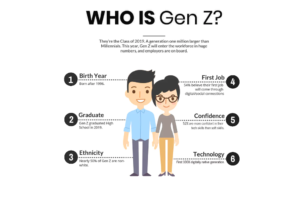why does gen z type in lowercase:-
Born in between the mid-1997-2012, has emerged as a distinct and influential demographic cohort, shaping cultural, social, and technological trends. born in an era of enhancing developments in digital technology topped with unmatched connectivity, Gen Zers are often characterized by their tech-savvy nature, open-mindedness, and a deep-rooted desire for authenticity.
As the first generation to grow up fully immersed in the digital age, their unique perspectives have given rise to various cultural phenomena, one of which is the widespread use of lowercase letters which we will be answering in this post as to why does gen z type in lowercase.
In this exploration, we delve into the intriguing phenomenon of why does gen z type in lowercase to communicate in this informal and seemingly unconventional manner.
Table of Contents
ToggleThe Casual Transformation:
The evolution of language and communication is a dynamic process influenced by cultural shifts, technological advancements, and generational nuances. why does gen z type in lowercase serves as a reflection of their desire for informality, authenticity, and a departure from traditional norms. Unlike their predecessors, who may have adhered to formal communication styles prevalent in professional and academic settings, Gen Z is reshaping the linguistic landscape by embracing a more casual and laid-back approach.

Apprehending the Cultural Context:
To comprehend with why does gen z type in lowercase -its a trend, it’s essential to examine the broader cultural context in which Generation Z has come of age. This generation witnessed the proliferation of social media platforms, where concise and quick communication became the norm. Platforms like Twitter, Instagram, and Snapchat, characterized by character limits and rapid content consumption, have played a pivotal role in shaping Gen Z’s communication style. In an era where brevity is valued, the use of lowercase letters allows for quicker and more efficient expression.
Additionally, Gen Zers are known for their strong emphasis on individuality and self-expression. The lowercase trend can be seen as a subtle rebellion against established norms, a way to assert their unique identity in a world inundated with information. By rejecting traditional grammatical conventions, they are creating a linguistic space that is distinctly their own.
Impact of Technology:
The omnipresence of smartphones and the advent of touchscreens have revolutionized the way we interact with digital devices. For Gen Z, who grew up swiping, tapping, and typing on touchscreens is an answer to why does gen z type in lowercase, in part, to the practicality and ease of use afforded by this method. Typing in lowercase letters is inherently less cumbersome, requiring fewer keystrokes and offering a more fluid and intuitive experience, aligning with the generation’s preference for efficiency.
Moreover, autocorrect and predictive text features prevalent in modern communication tools have contributed to the acceptance of lowercase typing. These technologies often correct capitalization automatically, making it easier for Gen Z to type quickly without worrying about adhering to conventional writing norms.
Expedition for Authenticity:
Generation Z is characterized by its skepticism toward traditional institutions and a preference for authenticity. This quest for genuine expression is reflected in various aspects of their lives, including language and communication. The use of lowercase letters can be seen as an intentional rejection of formality and pretense, allowing for a more authentic and unfiltered form of expression that is why does gen z type in lowercase.
In an age where curated online personas and carefully crafted images abound, Gen Z’s lowercase typing can be perceived as a means of cutting through the noise and presenting a more authentic version of themselves. The lack of capitalization is symbolic of a rejection of societal expectations and an embrace of a more relaxed and genuine form of communication.
Role of Memes and the trend on Internet :
Internet culture, particularly the world of memes, has played a significant role in shaping the communication style of Generation Z. Memes often rely on unconventional and humorous approaches to convey messages, and the use of lowercase letters aligns seamlessly with this irreverent and playful online culture.
The prevalence of memes in shaping language and communication cannot be understated. Memes often prioritize humor and relatability over formal grammar, and Gen Z’s affinity for this type of content has undoubtedly influenced their communication style. The use of lowercase letters, at times resembling the captions of popular memes, can be seen as an extension of this online subculture permeating into everyday communication.
Challenges and Criticisms:
While the lowercase typing trend is widely accepted and embraced by many in Generation Z, it has not been without its share of challenges and criticisms. Traditionalists argue that the abandonment of proper capitalization reflects a decline in language standards and a lack of respect for established norms. Critics often express concerns about the potential impact on written communication skills, fearing that the informal style could hinder professional and academic success.
However, proponents of the lowercase trend argue that effective communication is not solely dependent on formal grammar and punctuation. They contend that understanding context and adapting to diverse communication styles are crucial skills in the contemporary world. Additionally, the informality associated with lowercase typing can foster a sense of inclusivity and approachability, breaking down barriers and encouraging open communication.
the lowercase typing trend among Generation Z is a fascinating and multifaceted phenomenon that reflects the cultural, technological, and individualistic aspects of this unique generation. From a rebellion against established norms to a quest for authenticity and a reflection of the influence of internet culture, lowercase typing has become a hallmark of Gen Z’s communication style.
As we navigate an ever-evolving linguistic landscape, it’s crucial to approach these trends with an open mind, recognizing that language is dynamic and continually shaped by the context in which it is used. Generation Z’s preference for lowercase letters is not just a stylistic choice; it’s a reflection of their desire to communicate in a way that feels authentic, efficient, and uniquely their own.